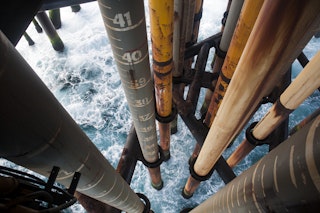2020 has been a turbulent year for E&P players on the Norwegian Continental Shelf (NCS). The year's happenings range from a significant reduction in activity when the oil and gas prices took a steep dive following the outbreak of the covid-19 pandemic, to optimism on a quick rise following the temporary adjustments in the petroleum tax regime. In this newsletter, the Thommessen oil & gas team will put some of last year's important events and trends into context.
Force majeure claims following the outbreak of covid-19
At the outset of the pandemic in mid-march, there was a wave of force majeure notices and claims in the E&P industry. Several ongoing development projects were delayed, and many projects have experienced cost overruns. We are likely to see an increase in disputes in connection with final settlements on these projects.
Now that the players on the NCS are adapting to the "new normal", we see a trend that risks related to covid-19 are adequately placed and priced in the commercial contract structures. Our project development team has kept busy with assisting clients in finding the best commercial and legal solutions to mitigate the risk of the many unknown factors which may affect projects, also in the years to come.
The temporary tax adjustments proved to be an effective tool to re-boost the activity
After a distinct dip in the activity level on the NCS in the wake of the pandemic outbreak, the Government adopted temporary changes to the petroleum tax system in June 2020 to boost activities and to cater for the significant drop in demand, oil and gas prices and the E&P companies' cash flow. We presented an overview of the temporary changes in our June newsletter. The stimulus package had an immediate effect with several projects sanctioned during the fall of 2020. Some of these projects may have been sanctioned anyway, but according to the operators on some of these, the package was a decisive factor. According to the Norwegian Petroleum Directorate (NPD), expected investments for the coming years are higher than the same estimate a year ago, which demonstrates that the temporary tax regime also has a longer effect on the activity level.
E&P business development has not been the main focus in 2020
Compared to 2019, the M&A landscape on the NCS has been fairly quiet in 2020. We have seen few structured processes and less bilateral processes than previous years. Most of the processes that were initiated prior to the pandemic outbreak were withdrawn or postponed.
Amongst the more significant events, HitecVision controlled Sval Energi acquired Edison Norge in a USD 300 million deal, making this the only corporate transaction on the NCS in 2020. The Thommessen team advised Energean on the acquisition of Edison's global E&P business, but Edison Norge was prior to closing excluded from the transaction perimeter. Recent years' trend where the majors divest their interests on the NCS continued, although in a slower pace than previous years, with Shell's sale of its interests in the Kvitebjørn and Valemon fields to PGNiG as an example.
Apart from M&A, it has become clear that 2020 really was the year for acceleration towards the green energy transition. A continually increasing portion of the larger NCS players' investments are made within other parts of the energy sector. Our position as a marked leading advisor to both the renewable and the E&P industry gives us a clear edge that several of our clients have benefitted from in cross-industry projects already. We certainly expect this development to continue.
Our clear impression is that several NCS players are keen to pursue attractive E&P assets should they come to market, and that both structured and bilateral processes will increase over the next months. This has partly to do with the oil price having stabilized somewhat around USD 55-60, and partly that we are moving towards a more normal situation now that the vaccination is progressing. In addition, the increased investor focus on ESG and the requirements driven by the introduction of the taxonomy in the European Union, may cause NCS players to use M&A to improve their portfolio in such respect, for example by divesting the assets in the portfolio with the highest carbon footprints.
There are few new players on the NCS, and some of the newcomers are struggling with finding attractive BD opportunities to build a more robust business case on. We also note that some of the existing players have aging fields and an inactive exploration philosophy. We believe that this will create consolidation opportunities in the form of mergers/takeovers.
High activity level on the development side and many tie-in negotiations underway
Despite the ongoing pandemic, 2020 has been characterized by high production and significant investments in developments and projects on the fields. As noted above, it is obvious that the temporary tax regime has and will continue to accelerate certain field developments.
With an increase in the number of field development projects, it is also expected that we will see more tie-in negotiations in the time to come. According to the NPD, the majority of exploration portfolios on the NCS will be developed as tie-backs to existing infrastructure. In 2020, four fields (Ærfugl, Dvalin, Tor and Skogul) came on stream, all tie-backs to existing infrastructure.
The regulatory regime for third party's use of existing infrastructure is set out in the TPA regulations. Having remained unamended since 2012, the regulations are at the outset stable and predictable for the industry. However, the applicable principles set out in the regulations have been interpreted and specified in important rulings from the Ministry of Petroleum and Energy (MPE) over the years. Hence, updated knowledge about these principles is vital in tie-in negotiations. The Thommessen team has been involved in the majority of tie-in negotiations on the NCS and MPE rulings the last years, and may provide updated and useful advice to negotiation teams.
Continued efforts to use legal measures to challenge the E&P industry
One of the most debated events in 2020 was the climate lawsuit. In a plenary judgement passed on 22 December 2020, the Supreme Court ruled in favor of the State. The case concerned the validity of the award of ten production licenses in the Barents Sea in the 23rd licensing round back in 2016. In the judgement, the Supreme Court concludes that the award could not be declared invalid. A different outcome would have raised several questions for the license partners in the licenses in question.
In December 2020, the Norwegian green party (MDG) filed a complaint to the EFTA Surveillance Authority (ESA) arguing that the temporary petroleum tax regime violates the state aid rules. It is highly unusual that a political party represented in the parliament files complaints on decisions made by the national assembly. MDG argues, inter alia, that the temporary petroleum tax regime is favoring the petroleum industry and discriminates between oil companies. In the parliament proposition, the temporary changes were deemed not to constitute a "selective advantage" similar to ESA's decision on cash refund of the tax value of petroleum exploration from 2019, and hence in accordance with the EEA Agreement. Normally, ESA aims to consider complaints within one year of receipt.
With the increasing environmental litigation processes all over Europe, new climate and environmental litigations cannot be ruled out. The European trend is clearly that legal measures are used to challenge the industry.
There is still high interest to explore for hydrocarbons on the NCS
In the Award in Pre-Defined Areas for 2020 (APA 2020), the MPE offered 61 production licenses on the NCS. The high interest in continued exploration activities demonstrates that there is still great interest in gaining access to new exploration acreage. The 61 production licenses are located in the North Sea (34), the Norwegian Sea (24) and the Barents Sea (3). The trend is clear – the players are more interested in known areas and near-field prospects than exploring the unknown in a more uncertain market.
In total 30 different companies were offered ownership interests in APA 2020, and similar for the last APA rounds, it is interesting to note that some of the historical key players on the NCS were more or less absent in the list a awardees.



